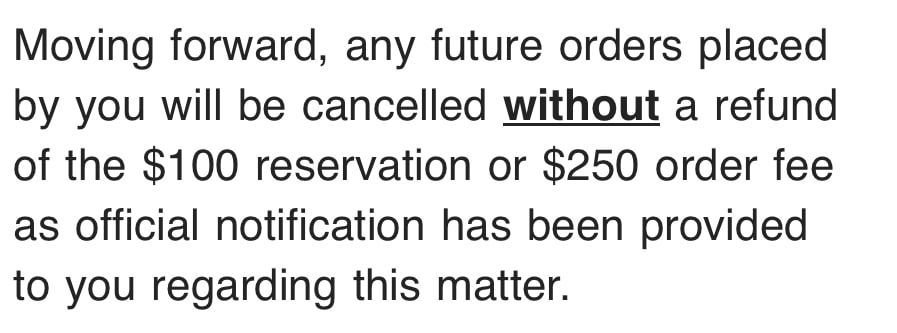- 💼 Tesla enforces its no-resale agreement on Cybertruck owners, banning one from future vehicle orders after attempting to sell.
- 🚫 Cybertruck’s no-resale agreement requests owners to refrain from selling the vehicle within the first year of ownership.
- 📧 Tesla notified the owner via email, canceling additional Cybertruck reservations and future orders due to resale attempts.
- 💰 Tesla reserves the right to seek injunctive relief or demand liquidated damages for violating the no-resale agreement.
- 📈 Tesla aims to ramp up Cybertruck production at its Gigafactory in Austin, Texas, within 12 to 18 months following initial deliveries.
In the world of electric vehicles (EVs), Tesla has long been synonymous with innovation and disruption. From sleek designs to cutting-edge technology, Tesla has continuously pushed the boundaries of what’s possible in the automotive industry. However, recent developments surrounding Tesla’s Cybertruck and its no-resale agreement have sparked significant debate and intrigue. Let’s delve deeper into this issue to understand its implications for Cybertruck owners and the broader EV community.

The No-Resale Agreement: What You Need to Know
Tesla’s no-resale agreement, particularly concerning the Cybertruck, has garnered attention due to its stringent terms. Here’s a breakdown of key points:
- Ownership Restriction: Cybertruck owners are urged to refrain from selling their vehicles within the first year of ownership, as per the terms of the agreement.
- Enforcement Measures: Tesla reserves the right to take action against owners who violate the no-resale agreement, including banning them from future vehicle orders and seeking financial compensation.
- Communication Protocol: Tesla notifies owners via email if they’re found to be in violation of the agreement, detailing the consequences and next steps.
Implications for Cybertruck Owners
The enforcement of Tesla’s no-resale agreement has significant implications for Cybertruck owners:
- Loss of Future Orders: Being banned from future vehicle orders can limit owners’ access to Tesla’s innovative lineup and potential upgrades.
- Financial Ramifications: Violating the agreement could result in financial penalties, including the forfeiture of reservation fees and potential liquidated damages.
- Community Backlash: The enforcement of such agreements may lead to backlash within the Tesla community, with some questioning the fairness and practicality of these restrictions.

Legal and Ethical Considerations
The debate surrounding Tesla’s no-resale agreement extends beyond contractual obligations:
- Legal Validity: Questions arise regarding the enforceability of such agreements and whether they infringe upon consumers’ rights.
- Ethical Dilemmas: Critics argue that restricting owners’ rights to sell their vehicles contradicts principles of ownership and consumer autonomy.
Tesla’s Production Plans and Market Dynamics
Understanding the context of Tesla’s production plans sheds light on the rationale behind the no-resale agreement:
- Gigafactory Expansion: Tesla’s efforts to ramp up Cybertruck production at its Gigafactory in Austin, Texas, underscore the company’s focus on meeting demand and scaling operations.
- Market Dynamics: Limited initial production capacity coupled with high demand for the Cybertruck may prompt Tesla to implement measures to control resale activity and ensure equitable distribution.
Moving Forward: Navigating the Road Ahead
As Cybertruck deliveries commence and production scales up, navigating the complexities of Tesla’s no-resale agreement becomes paramount. Here are some considerations:
- Compliance Awareness: Cybertruck owners must be aware of the terms outlined in the purchase agreement to avoid unintended violations.
- Consumer Advocacy: Advocacy groups and legal experts may scrutinize Tesla’s policies to safeguard consumer rights and promote transparency.
- Industry Dialogue: Open dialogue between Tesla, owners, and industry stakeholders can foster understanding and address concerns surrounding ownership rights and contractual obligations.
Conclusion: Balancing Innovation and Accountability
Tesla’s no-resale agreement reflects the company’s commitment to ensuring fair and equitable access to its products while managing supply and demand dynamics. However, striking a balance between innovation and accountability requires careful consideration of legal, ethical, and consumer-centric perspectives.
As the EV landscape evolves, ongoing dialogue and collaboration are essential to navigate the intersection of technological advancement and consumer rights effectively.





